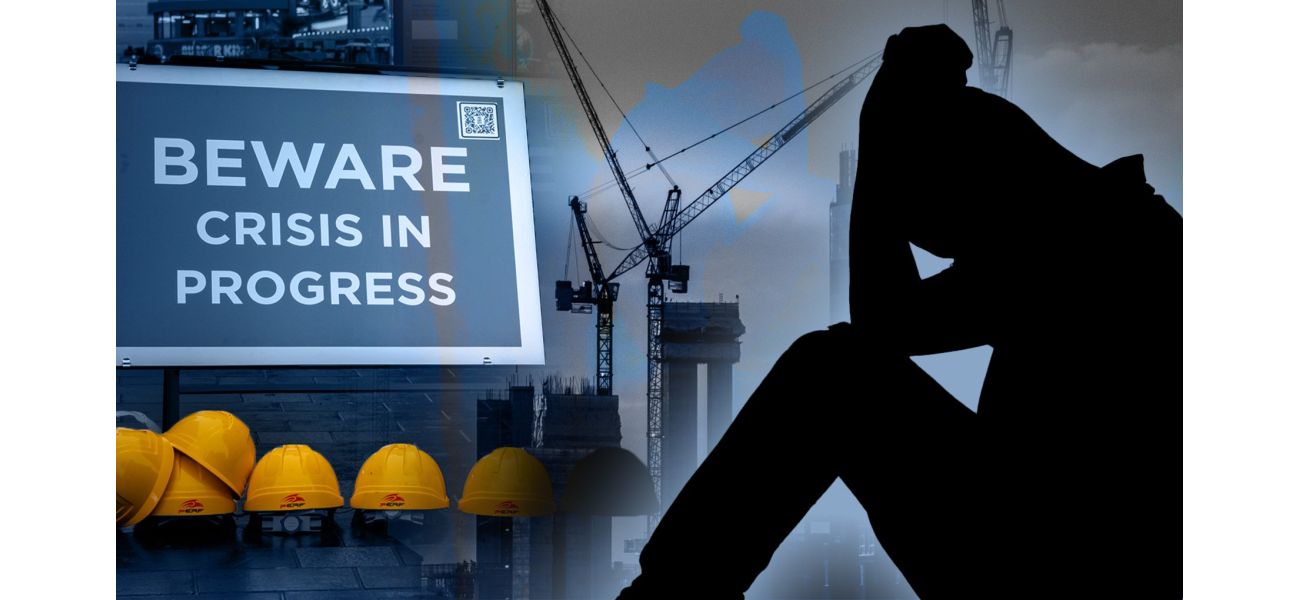A city was never constructed due to a tragic cause.
Work demands, contracts, and supply expenses can create stress.
December 17th 2024.

The construction industry in the UK has been facing a devastating crisis, one that has gone unnoticed for far too long. As the sun rose on a cold winter morning, construction workers all across the country donned their high visibility gear and placed hard hats on the ground, symbolizing the thousands of colleagues who had tragically lost their lives. They also displayed signs with powerful messages, such as "we apologize for any inconvenience during the suicide crisis" and "STOP, suicide in construction". Their goal was to bring attention to the silent epidemic that has been plaguing their sector for over a decade.
One man who knows all too well the gravity of this crisis is Kryss Tominay, a stonemason from Yorkshire. In a candid interview with Metro, he bravely shared his own struggles with mental health and how he was very close to becoming another statistic. "I've attempted suicide a few times," he revealed. "I felt like everyone would be better off without me." Kryss has been battling with his mental health since he was 18, seeking help from doctors and trying different medications. But it wasn't until therapy that he was able to come to terms with his struggles.
Things got so bad for Kryss that in 2018, he found himself standing on a railway bridge, contemplating taking his own life. But as he saw the train lights approaching, he had a realization. "What am I doing?" he thought. Kryss, who started his own business, Tominay Stone, at the age of 16, understands the difficulty of reaching out for help as a man in the construction industry. "I've lost three friends to suicide," he sadly shared. "One was my best friend, and no one knew how he was feeling. The second was a friend of my younger brother, and another young man from my area took his own life just this year."
The stigma surrounding mental health in the construction industry is a major barrier for many men like Kryss. The "macho" culture and fear of appearing weak prevent them from opening up and seeking support. That's why Kryss and many others are calling for more people in the industry to share their own experiences and break this cycle of silence.
The statistics are alarming, with an estimated two tradespeople taking their own lives every day. The pressure of tight contracts, long working hours, time away from loved ones, and rising supply costs all contribute to the mental health crisis within the industry. Lee Wilcox, CEO of On the Tools, a company created to address recruitment challenges in construction, believes that the industry has reached a breaking point. "If a tradesperson is asked about their mental health by an employer, they'll likely say they're fine, even if they're not," he explained. "They're afraid of being sent home because if they don't work, they don't get paid and can't support their families."
In 2014, Lee launched On the Tools, which also works to raise awareness about issues like tool theft and mental health. But this year, he took it a step further and launched the "Lost City" campaign. Through this campaign, he hoped to shed light on the devastating impact of the 7,000 construction worker deaths by suicide in the last decade. "We've missed out on building a city the size of Cardiff," he shared. "A city that could have provided affordable homes, schools, apartment blocks, offices, and hospitals." The campaign took place in major cities across the UK, with powerful signs that made people stop in their tracks and take notice.
The construction industry has the highest suicide rate of any industry in the UK, and Lee believes that there needs to be a mental health version of the health and safety procedures in place to prevent these tragedies. According to the Office for National Statistics, the construction industry's suicide rate is four times the national average. The demanding work hours, financial pressures, and high levels of isolation all contribute to the mental health struggles faced by over 70% of tradespeople. And unfortunately, 64% turn to alcohol or drugs to cope.
Former construction worker Gavin Crane, who is now the CEO of Band of Builders, a charity that supports tradespeople and their families through difficult times, described the mental health crisis as a "dripping tap" with a bucket underneath. "The drips represent stress, anxiety, depression, and industry pressures," he explained. "Without a release, the bucket overflows." He knows firsthand how easy it is to suffer in silence and is determined to break the stigma and provide support for those in need.
The construction industry's mental health crisis has been ignored for far too long, and it's time for a change. With brave individuals like Kryss, Lee, and Gavin speaking out and raising awareness, there is hope for a brighter future for those in the industry. But it will take a collective effort to break the silence and provide the support and resources needed for those struggling with their mental health.
The construction industry in the UK is currently facing a devastating crisis - one that is often overlooked and rarely talked about. As the cold winter morning dawned, construction workers across the country gathered together and put on their high visibility gear, while also displaying hard hats in honor of the thousands of colleagues who have lost their lives. Signs with powerful messages such as "we apologize for any inconvenience during the suicide crisis" and "STOP, suicide in construction" were also prominently displayed, in an effort to raise awareness of the silent epidemic that has been plaguing the sector for far too long.
One of the individuals who joined this powerful movement is Kryss Tominay, a stonemason from Yorkshire. He bravely shares his own personal struggle with mental health, admitting that he had attempted suicide multiple times. "I felt like everyone would be better off without me," he confesses. Kryss had been struggling with his mental health since he was 18, and despite seeking help from doctors and taking medication, he found himself in a constant cycle of ups and downs. Instead of reaching out for support, he would often push people away and isolate himself, until it became too much to bear. "I just wanted someone to ask me if I was okay," Kryss explains, highlighting the importance of having someone to talk to during difficult times.
Fortunately, Kryss recently finished therapy and has been able to come to terms with his mental health. However, things were not always this positive for him. In 2018, he found himself contemplating ending his own life at a railway bridge. It was only when he saw the train lights approaching that he realized the gravity of his actions and stopped himself. Kryss, who has been in the construction industry since he was 16, knows how difficult it can be for men in this field to open up about their struggles. "I've lost three friends to suicide," he sadly shares. "One was my best friend, and it's still upsetting because no one knew how he was feeling. Another was a friend of my younger brother's, and the third was a lad from our neighborhood who took his own life earlier this year."
The construction industry is known for its tough and macho culture, and this often makes it difficult for men to talk about their emotions and mental health. This is why Kryss and many others are calling for more people in the industry to share their experiences and break the stigma surrounding mental health. It is estimated that two tradespeople die by suicide every day, and the intense pressures of the job - from tight deadlines and long hours to being away from loved ones and rising costs - can all take a toll on one's mental well-being.
Lee Wilcox, CEO of On the Tools, explains that the mental health crisis in the construction industry has reached a breaking point. "If a tradesperson is asked about their mental health by an employer, they'll likely say they're fine even if they're not," he reveals. "This could be because they're afraid of being sent home and losing income, which would affect their ability to support their families." On The Tools, a company that was initially launched to tackle recruitment challenges within the industry, has now expanded its focus to raising awareness on various issues, including mental health.
Determined to make a difference and reduce the number of suicides in their field, Lee launched the "Lost City" campaign earlier this year. The campaign highlighted the shocking statistic that the UK has missed out on building a city the size of Cardiff due to the 7,000 construction worker deaths by suicide in the past decade. "The signs we put up in major cities like London, Bristol, and Manchester made people literally stop in their tracks to take pictures and videos," Lee shares. It is estimated that these individuals could have built 150,000 affordable homes, 78 schools, 200 apartment blocks, 30 small offices, and one large hospital.
The construction industry has the highest suicide rate of any industry in the UK, and this is made even more alarming by the fact that it is already a dangerous profession. Heavy machinery, hazardous materials, and working at heights are just some of the risks that workers face every day. There are strict health and safety procedures in place to protect them from these physical dangers, but there is no equivalent for mental health. According to the Office for National Statistics, the suicide rate in the construction industry is four times the national average. The demanding work hours, financial pressures, and high levels of isolation often overshadow mental health struggles, leading to dire consequences. In fact, over 70% of tradespeople report experiencing mental health issues, and 64% turn to alcohol or drugs to cope with the stress.
Gavin Crane, former construction worker and current CEO of Band of Builders, knows firsthand the impact of neglecting one's mental health. "It's like a dripping tap with a bucket underneath," he explains. "The drips represent stress, anxiety, depression, and industry pressures. Without a release, the bucket overflows." His charity is dedicated to supporting tradespeople and their families through difficult times, and he emphasizes the importance of seeking help and talking about one's mental health. It is time for the construction industry to break the silence and prioritize the well-being of its workers.
One man who knows all too well the gravity of this crisis is Kryss Tominay, a stonemason from Yorkshire. In a candid interview with Metro, he bravely shared his own struggles with mental health and how he was very close to becoming another statistic. "I've attempted suicide a few times," he revealed. "I felt like everyone would be better off without me." Kryss has been battling with his mental health since he was 18, seeking help from doctors and trying different medications. But it wasn't until therapy that he was able to come to terms with his struggles.
Things got so bad for Kryss that in 2018, he found himself standing on a railway bridge, contemplating taking his own life. But as he saw the train lights approaching, he had a realization. "What am I doing?" he thought. Kryss, who started his own business, Tominay Stone, at the age of 16, understands the difficulty of reaching out for help as a man in the construction industry. "I've lost three friends to suicide," he sadly shared. "One was my best friend, and no one knew how he was feeling. The second was a friend of my younger brother, and another young man from my area took his own life just this year."
The stigma surrounding mental health in the construction industry is a major barrier for many men like Kryss. The "macho" culture and fear of appearing weak prevent them from opening up and seeking support. That's why Kryss and many others are calling for more people in the industry to share their own experiences and break this cycle of silence.
The statistics are alarming, with an estimated two tradespeople taking their own lives every day. The pressure of tight contracts, long working hours, time away from loved ones, and rising supply costs all contribute to the mental health crisis within the industry. Lee Wilcox, CEO of On the Tools, a company created to address recruitment challenges in construction, believes that the industry has reached a breaking point. "If a tradesperson is asked about their mental health by an employer, they'll likely say they're fine, even if they're not," he explained. "They're afraid of being sent home because if they don't work, they don't get paid and can't support their families."
In 2014, Lee launched On the Tools, which also works to raise awareness about issues like tool theft and mental health. But this year, he took it a step further and launched the "Lost City" campaign. Through this campaign, he hoped to shed light on the devastating impact of the 7,000 construction worker deaths by suicide in the last decade. "We've missed out on building a city the size of Cardiff," he shared. "A city that could have provided affordable homes, schools, apartment blocks, offices, and hospitals." The campaign took place in major cities across the UK, with powerful signs that made people stop in their tracks and take notice.
The construction industry has the highest suicide rate of any industry in the UK, and Lee believes that there needs to be a mental health version of the health and safety procedures in place to prevent these tragedies. According to the Office for National Statistics, the construction industry's suicide rate is four times the national average. The demanding work hours, financial pressures, and high levels of isolation all contribute to the mental health struggles faced by over 70% of tradespeople. And unfortunately, 64% turn to alcohol or drugs to cope.
Former construction worker Gavin Crane, who is now the CEO of Band of Builders, a charity that supports tradespeople and their families through difficult times, described the mental health crisis as a "dripping tap" with a bucket underneath. "The drips represent stress, anxiety, depression, and industry pressures," he explained. "Without a release, the bucket overflows." He knows firsthand how easy it is to suffer in silence and is determined to break the stigma and provide support for those in need.
The construction industry's mental health crisis has been ignored for far too long, and it's time for a change. With brave individuals like Kryss, Lee, and Gavin speaking out and raising awareness, there is hope for a brighter future for those in the industry. But it will take a collective effort to break the silence and provide the support and resources needed for those struggling with their mental health.
The construction industry in the UK is currently facing a devastating crisis - one that is often overlooked and rarely talked about. As the cold winter morning dawned, construction workers across the country gathered together and put on their high visibility gear, while also displaying hard hats in honor of the thousands of colleagues who have lost their lives. Signs with powerful messages such as "we apologize for any inconvenience during the suicide crisis" and "STOP, suicide in construction" were also prominently displayed, in an effort to raise awareness of the silent epidemic that has been plaguing the sector for far too long.
One of the individuals who joined this powerful movement is Kryss Tominay, a stonemason from Yorkshire. He bravely shares his own personal struggle with mental health, admitting that he had attempted suicide multiple times. "I felt like everyone would be better off without me," he confesses. Kryss had been struggling with his mental health since he was 18, and despite seeking help from doctors and taking medication, he found himself in a constant cycle of ups and downs. Instead of reaching out for support, he would often push people away and isolate himself, until it became too much to bear. "I just wanted someone to ask me if I was okay," Kryss explains, highlighting the importance of having someone to talk to during difficult times.
Fortunately, Kryss recently finished therapy and has been able to come to terms with his mental health. However, things were not always this positive for him. In 2018, he found himself contemplating ending his own life at a railway bridge. It was only when he saw the train lights approaching that he realized the gravity of his actions and stopped himself. Kryss, who has been in the construction industry since he was 16, knows how difficult it can be for men in this field to open up about their struggles. "I've lost three friends to suicide," he sadly shares. "One was my best friend, and it's still upsetting because no one knew how he was feeling. Another was a friend of my younger brother's, and the third was a lad from our neighborhood who took his own life earlier this year."
The construction industry is known for its tough and macho culture, and this often makes it difficult for men to talk about their emotions and mental health. This is why Kryss and many others are calling for more people in the industry to share their experiences and break the stigma surrounding mental health. It is estimated that two tradespeople die by suicide every day, and the intense pressures of the job - from tight deadlines and long hours to being away from loved ones and rising costs - can all take a toll on one's mental well-being.
Lee Wilcox, CEO of On the Tools, explains that the mental health crisis in the construction industry has reached a breaking point. "If a tradesperson is asked about their mental health by an employer, they'll likely say they're fine even if they're not," he reveals. "This could be because they're afraid of being sent home and losing income, which would affect their ability to support their families." On The Tools, a company that was initially launched to tackle recruitment challenges within the industry, has now expanded its focus to raising awareness on various issues, including mental health.
Determined to make a difference and reduce the number of suicides in their field, Lee launched the "Lost City" campaign earlier this year. The campaign highlighted the shocking statistic that the UK has missed out on building a city the size of Cardiff due to the 7,000 construction worker deaths by suicide in the past decade. "The signs we put up in major cities like London, Bristol, and Manchester made people literally stop in their tracks to take pictures and videos," Lee shares. It is estimated that these individuals could have built 150,000 affordable homes, 78 schools, 200 apartment blocks, 30 small offices, and one large hospital.
The construction industry has the highest suicide rate of any industry in the UK, and this is made even more alarming by the fact that it is already a dangerous profession. Heavy machinery, hazardous materials, and working at heights are just some of the risks that workers face every day. There are strict health and safety procedures in place to protect them from these physical dangers, but there is no equivalent for mental health. According to the Office for National Statistics, the suicide rate in the construction industry is four times the national average. The demanding work hours, financial pressures, and high levels of isolation often overshadow mental health struggles, leading to dire consequences. In fact, over 70% of tradespeople report experiencing mental health issues, and 64% turn to alcohol or drugs to cope with the stress.
Gavin Crane, former construction worker and current CEO of Band of Builders, knows firsthand the impact of neglecting one's mental health. "It's like a dripping tap with a bucket underneath," he explains. "The drips represent stress, anxiety, depression, and industry pressures. Without a release, the bucket overflows." His charity is dedicated to supporting tradespeople and their families through difficult times, and he emphasizes the importance of seeking help and talking about one's mental health. It is time for the construction industry to break the silence and prioritize the well-being of its workers.
[This article has been trending online recently and has been generated with AI. Your feed is customized.]
[Generative AI is experimental.]
0
0
Submit Comment





